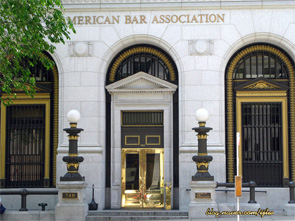WASHINGTON, Aug. 8, 2013- The American Bar Association (ABA) will vote next week on whether to support the repeal of the Animal Enterprise Terrorism Act (AETA), a law passed in 2006 intended to curtail violent or threatening acts by animal rights organizations.
ABA will vote on Resolution 116, proposed by the New York City Bar Association, which “urges Congress to repeal” the AETA and “urges the Department of Justice to forbear from any further prosecutions under the Act.”
According to the New York City Bar Association’s report accompanying the resolution, the AETA includes overly broad and unconstitutional restrictions on First Amendment rights.
Supporters of the legislation say it serves to protect the biomedical research community and other various animal enterprises from violent and threatening conduct. The AETA includes a provision that the law cannot be used to prohibit “any expressive conduct (including peaceful picketing or other peaceful demonstration) protected from legal prohibition by the First Amendment to the Constitution.”
However, the NYC Bar Association maintains that this savings clause is an insufficient protection.
“The law’s savings clause does offer an example of protected conduct, ‘peaceful picketing,’ but its parenthetical reference provides insufficient guidance for a person faced with a highly fact specific question of whether a certain activity falls within the law’s scope,” according to the resolution.
The NYC Bar Association recently filed an appeal to a dismissed case in which the association represented five animal activists challenging the constitutionality of the law. The judge dismissed the case because he ruled that the individuals had no standing to establish a reasonable chill on their First Amendment rights.
“Where Plaintiffs seek to engage in lawful and peaceful investigation, protest, public-speaking, and letter-writing, the court cannot reasonably conclude that these actions fall within the purview of a statute requiring intentional damage or loss to property or creation in an individual of a reasonable fear of death,” U.S. District Judge Joseph Tauro wrote.
He further clarified in his conclusion that “read straightforwardly,” the AETA only criminalizes: intentionally damaging or causing the loss of real or personal property; intentionally placing a person in reasonable fear of death or serious bodily injury; and conspiring or attempting to commit either of these two acts.
A memorandum published by the National Turkey Federation and written by Policy Directions Inc. Executive Vice President Steve Kopperud claims the repeal of the law would likely result in an increase of harassment, threats of violence and acts of destruction to researchers, universities and other institutions using animals for medical research or agriculture.
A report published in May 2013 by a division of the Department of Homeland Security focuses on criminal incidents committed by environmental and animal rights extremists between 1995 and 2010, specifically arsons and bombings conducted by individuals affiliated with the Earth Liberation Front (ELF) and Animal Liberation Front (ALF).
Between 1995 and 2010, there were a total of 239 arsons and bombings committed by these groups, with 55 percent attributed to ELF and 45 percent attributed to ALF, the report states. However, the division found that the number of incidents decreased after passage of the AETA.
“Overall, the numbers of incidents between 2006 and 2010 remain low compared to the period between 2003 and 2005,” according to the report.
AETA passed in 2006 as an amendment to the Animal Enterprise Protection Act of 1992 that more narrowly protected certain animal facilities from arson and similar attacks.
Before AETA passed in 2006, Department of Justice Deputy Assistant Attorney General, Brent McIntosh, testified at a congressional hearing in May of that year before members of the House Judiciary Committee. He said the proposed law “will make clear and unequivocal the application of the statute to recent trends in animal rights extremism and will enhance the effectiveness of the Department's response to this domestic threat.”
He further testified that “extremists” were engaged in a nationwide campaign to “intentionally place our fellow law-abiding citizens in reasonable fear of the death of, or serious bodily injury to, themselves or loved ones because of their association with animal enterprises.”
He said no federal criminal laws directly facilitated the investigation and prosecution of such “outrageous, violent acts.”
However, the NYC Bar maintains in its report that AETA reaches beyond extreme acts or intentions of violence. Resolution 116 maintains that AETA targets conduct “that also causes only economic harm, such as lost profits,” which poses issues regarding due process and the Fifth Amendment.
The ABA is expected to review Resolution 116 on Aug. 12.
#30
For more news, go to www.agri-pulse.com

